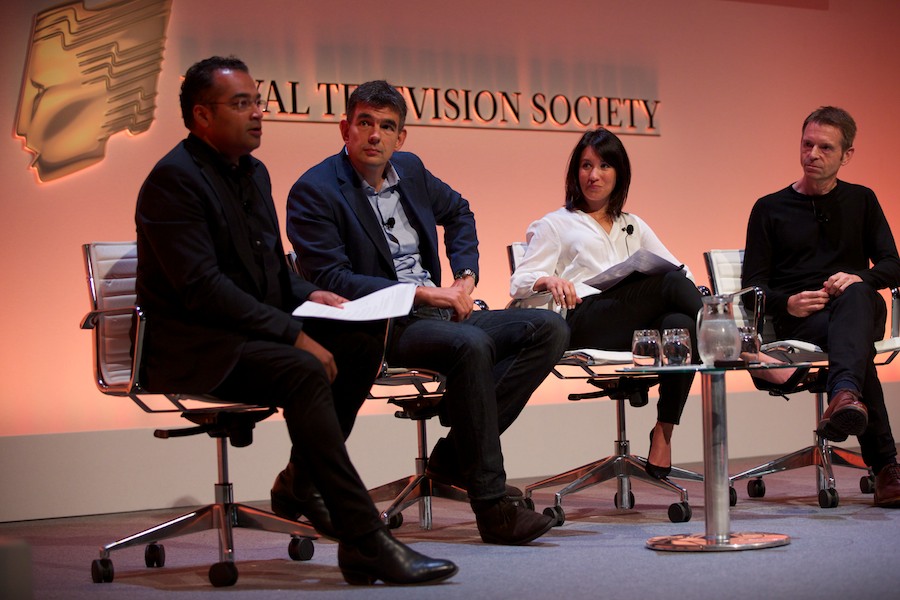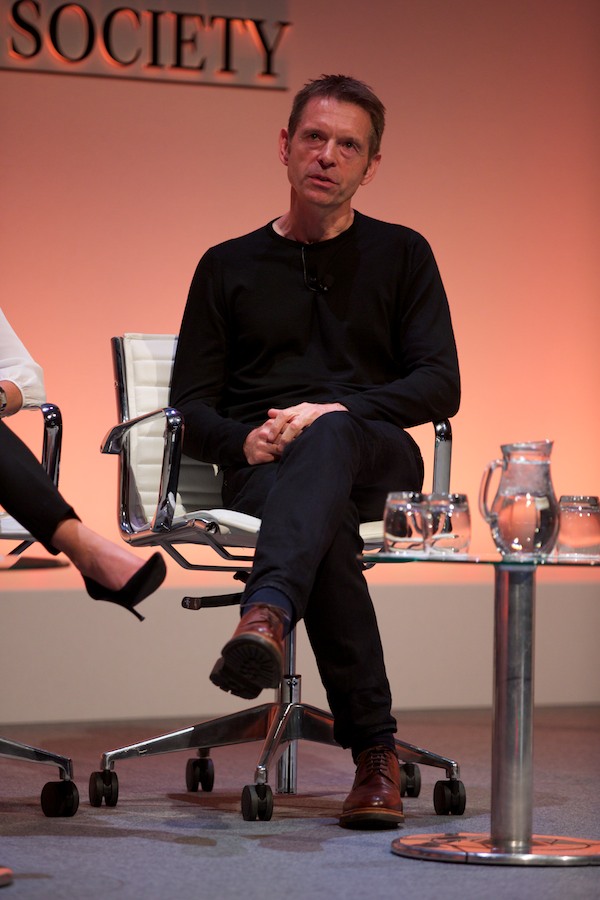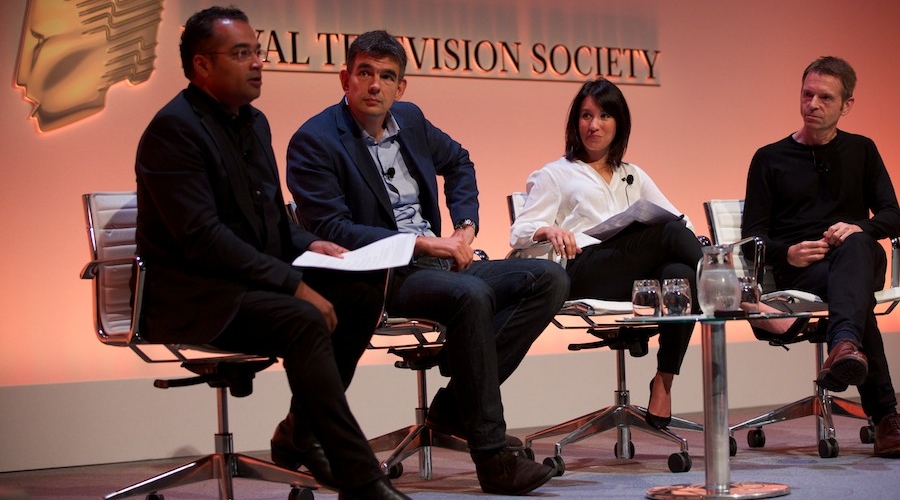A panel of digital disruptors tells broadcasters and producers how to adapt to the new world.
For many new-media innovators, TV is the dinosaur of the digital landscape – over-sized and lumbering its way to inevitable extinction.
Nimble online outfits will replace it, they argue, offering viewers the content they want, when they want it and on the device of their choice.
But, according to the experts – all from internet-driven companies – assembled for the session, “The Future You Don’t Want To Face”, TV has plenty of life left in it.
Channel 4 News presenter Krishnan Guru-Murthy, who chaired a session that he said was “designed to scare” the audience, posed three questions: Is television losing power? Are television channels becoming obsolete? Who are the financial winners and losers?
Answers were provided by Matt Brittin, Google’s chief of Northern and Central Europe; Facebook Head of International Media Karla Geci; and Kevin Sutcliffe, Head of News Programming in Europe for Vice News.
The background to the debate was framed by statistics that revealed that younger viewers are deserting the TV set for online and mobile platforms.
“We have to reach a point where we start viewing changing behaviours as an opportunity, not a threat,” argued Geci. “The access to TV is changing for the better. We have to be open to redefining what broadcast content is and how to reach that demographic through various access points.”
As a good example of an innovator, she mentioned BBC News, which is producing 15-second videos for Instagram users.
Sutcliffe, who worked in traditional television with the BBC and Channel 4 before joining Vice News, argued that programming is more important than the platform it plays on.
“The screen is irrelevant; it’s content that’s at issue here and how that content speaks to the audience,” he said.
Vice, he added, has an “enormously engaged, sophisticated audience” thirsting for more than news snippets.
“There is a huge number of young people who want to watch long-form, in-depth news about the world,” Sutcliffe claimed.
Google’s Brittin offered an analogy using the BBC’s Doctor Who to explain the myriad opportunities for programme-makers that exist beyond conventional TV.
“Doctor Who is all about fans and it’s all about time and space. So, if you break out of the linear TV schedules, you have all of time and space available – you can have your content viewed by anybody around the world, when they want it.
“Something like 60% of YouTube original content is viewed outside the country it was made in.”
Emphasising the opportunities for UK content producers, Brittin added: “There are 2.5 billion people online today and there’ll be 5 billion online in 2020. You’ve got some of the best content in the world and suddenly you can distribute it to everybody. What’s not to like?”
“Our platform is designed to be slippery. A lot of the content on YouTube is not viewed on the website; it’s viewed on Facebook, email links, Twitter and across the web" Brittin
YouTube, which Google bought in 2006, has some 1 billion users. It claims that 6 billion hours of video are watched every month.
“Watch time is growing by about 50%, year on year,” said Brittin. “The revenue we’re paying out to content creators is growing faster than that. We have thousands of channels that are earning six-figure sums.”
This growth is increasingly driven by mobile, with almost 40% of YouTube views now on mobile devices. Facebook has become even more of a mobile platform – 65% of its 1 billion daily views are via mobile devices.
The panel then addressed television’s apparently waning powers. Responding to the comments of media execs (in a video package played to the audience) discussing BBC Three’s pro-posed move online, Brittin said: “You want to be where the audience is. Ideally, BBC Three would be on television and on YouTube, Facebook and [its] own online services. Be experimental – don’t close yourself off on one platform. We are in a world where people have got choice.
“Our platform is designed to be slippery. A lot of the content on YouTube is not viewed on the website; it’s viewed on Facebook, email links, Twitter and across the web.
“The reason it’s so popular with content creators is that it gives [them] the chance to use our technology to get content to wherever you want it,” added Brittin.

Vice, argued Sutcliffe, is a “content creation platform” that “is trying to place itself in the marketplace in as many places as possible”.
This, he added, includes “high-quality, old-fashioned telly”, such as Vice on HBO, which won an Emmy this year for Outstanding Informational Series or Special.
Vice, he added, had grown “organically in an online place. There is an audience out there that wants [Vice] and has come to it in huge numbers.”
Terrestrial TV, however, finds it more difficult to develop online: “It’s a baffling thing [for them] because they’re used to having rivals, [such as] the BBC and ITV, and scheduling.”
Arguably overstating the decline of TV, Guru-Murthy asked whether ITV juggernaut The X Factor still needs a TV presence to prosper.
“It could survive by itself, but being on ITV and drawing audiences of something like 11 million is unique – I wouldn’t give it up if I was Simon Cowell,” said Brittin.
The Google exec recalled, however, ITV’s frustration when Britain's Got Talent contestant Susan Boyle’s rendition of I Dreamed a Dream received 150 million views on YouTube and the broadcaster “hadn’t got a deal in place to exploit that fully. That was a wake-up call.”
Addressing Guru-Murthy’s final question – who are the financial winners and losers? – Brittin reckoned that “in the long term, the people who will win financially are hopefully the audiences and the content creators”.
Guru-Murthy, however, noted that for Google as a platform the advertising deal it had struck with content creators was “very favourable to you”, offering it a “huge chunk” of the returns.
“I don’t know where you get your facts from,” responded Brittin. “With the advertising on YouTube, we pay the majority of it out to content creators.”
Guru-Murthy pressed for a precise figure but Brittin resisted, conceding only that “in excess of 50% of the revenue goes to the content creators. Ideally we want to get to the point where we can give more.”

Wrapping up proceedings, Guru-Murthy asked the three panellists to pinpoint how budding entrepreneurs could make money out of new media.
“They have to be doing more than creating content – they have to be creating value,” argued Geci.
She said this value would be in “having intellectual property, great product and customer experience”.
“You own your content outright and you license it,” reckoned Sutcliffe, who also recommended forming “technology and content partnerships”.
“I’m not sure if I agree with that 100%,” replied Geci. “Taking Netflix as an example, it is doing lots of deals where it is not looking for exclusivity. Where it is able to win out is by having a great product, great customer experience, being able to deliver powerful recommendations and winning on all fronts, not just the one.”
Brittin identified advertising as one of the keys to a lucrative future. “The technology behind advertising is changing rapidly and dynamically,” he explained. “Let’s say something on YouTube gets 5 million views. What if every single one of those people has a different ad that’s tailored to the kind of stuff they want to watch and what their demographics are. Advertisers [would] only pay when someone chooses to watch the ad.”
In this future, he continued, all parts of the media landscape would benefit: “You’d get a better user experience with advertising that entertains and engages you; the advertiser gets a better audience; and the content creator makes more money.
“We’re at the beginning of this transition at the moment. In the long run, I’m optimistic; in the short and medium term, you won’t make the same amount of money as you do on ITV with The X Factor, but the sums are getting bigger.”
In the meantime, Brittin advised: “Get out there and experiment and figure out what’s going on. Don’t sit back and let other people learn how to make it work.”
Session Two, ‘The Future You Don’t Want To Face’, was produced by Darren Childs and Zoe Clapp and chaired by Krishnan Guru-Murthy, Channel 4 News. The panellists were: Matt Brittin, President, Northern and Central Europe Operations Google; Karla Geci, Head of International Media, Facebook; and Kevin Sutcliffe, Head of News Programming EU, Vice News.
Is TV losing its power?
Claire Enders, founder and CEO of Enders Analysis: ‘All traditional media companies are affected by technology change… The increase in the penetration of tablets and smart phones has had a substantial effect on consumption, particularly of younger demographics.
‘Over the past 18 months we’ve seen a 22% fall in viewing in four- to 15-year-olds and 15% drop in 16- to 34-year-olds.’
Michael Stevens, founder of the Vsauce YouTube network: ‘We have 10 million views every week… YouTube is the right medium for what we’re doing because we can create whatever we want, whenever we want to, and send that right to our fans and get feedback from them.
So, I don’t have to listen to notes from some high-up group of bureau -crats – I just upload what I want to upload.’
Sam Barcroft, CEO of online news channel Barcroft TV: ‘We get more than 40 million views a month globally… Customer demand is what’s going to rule the next decade.
‘All of us have less free time… and so video-on-demand makes a lot more sense than TV.’
Will TV channels become obsolete?
Henry Normal, co-founder of Baby Cow: ‘I can see why the BBC put BBC Three online. There’s the whole issue of the licence fee and [whether] young people will pay [it] in the future.’
Zai Bennett, Director of Sky Atlantic (and, until recently, Controller of BBC Three): ‘Channels have a huge amount of power and Sky recognises that and has put a huge amount of money behind the channels and the channel brands.
‘They are a really great way for our audience to navigate, to know what to expect.
‘I think BBC Three will have an interesting future and it is definitely ahead of the market, if not beyond it.’
Roy Ackerman, Managing Director of Fresh One Productions: ‘There will be big content on televisions that families will sit around in future, in living rooms up and down the country…
They’ll probably be watching a big entertainment show, big drama, sport and great factual content and factual entertainment.’
Who's a winner? Who's a loser?
Michael Stevens: ‘The winners will be the ones who embrace all technologies and media experiences.’
Zai Bennett: ‘The big winners will be the ones who own rights and content. The best content will always win out. Content is king.’
Henry Normal: ‘You’ve got to look to film as a way that television might go because film is a big version of television. Film faces the world, whereas a lot of TV is very local.
It may be in the future that the funding model for TV is very similar to film, that we have pre-buys and we launch [programmes] as a world event. Hopefully, there will still be room for the smaller, local things.’
Sam Barcroft: ‘If I was in charge of one of the bigger broadcasters, I’d cut the costs in half and be more experimental… Some of these organisations are full of people getting paid very well to not do a great deal.’
Claire Enders: ‘I’d be looking for the next Game of Thrones – that’s the best way to future-proof any business – find the next wonderful franchise.’







